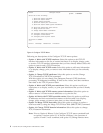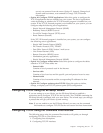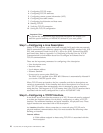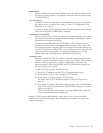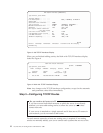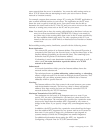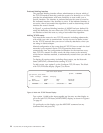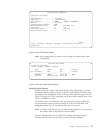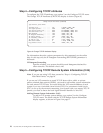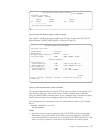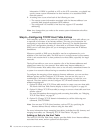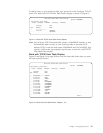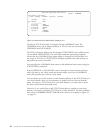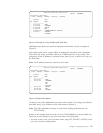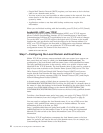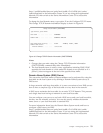
Step 4—Configuring TCP/IP attributes
To configure the TCP/IP attributes, type option 3 on the Configure TCP/IP menu.
The Change TCP/IP Attributes (CHGTCPA) display is shown (Figure 8).
For information about the various parameters for this command, see the online
help. In this step only the IP Datagram Forwarding (IPDTGFWD) parameter is
discussed.
IP Datagram Forwarding
Specifies whether your system should forward datagrams destined for
other networks. The default value is *NO.
Step 5—Configuring TCP/IP Remote System Information (X.25)
Note: If you are not using X.25, then proceed to “Step 6—Configuring TCP/IP
Host Table Entries” on page 18.
If you use an X.25 connection to reach TCP/IP hosts with a public or private
packet switched data network (PSDN), you need to add remote system information
for each remote TCP/IP host. You must define the X.25 network address of each
system if you use a switched virtual circuit (SVC). If a permanent virtual circuit
(PVC) is set up by the network connecting your system with your remote TCP/IP
partner, you need to know the local logical channel identifier of this PVC.
Adding Remote System Information (X.25)
To add an X.25 remote system address, type option 5 on the Configure
TCP/IP menu. The Work with the TCP/IP Remote System Information
display appears, as shown in Figure 9 on page 17.
Change TCP/IP Attributes (CHGTCPA)
Type choices, press Enter.
TCP keep alive......... 120 1-40320, *SAME, *DFT
TCP urgent pointer....... *BSD *SAME, *BSD, *RFC
TCP receive buffer size .... 8192 512-8388608, *SAME, *DFT
TCP send buffer size...... 8192 512-8388608, *SAME, *DFT
UDP checksum.......... *YES *SAME, *YES, *NO
IP datagram forwarding..... *YES *SAME, *YES, *NO
IP source routing ....... *YES *SAME, *YES, *NO
IP reassembly time-out..... 10 5-120, *SAME, *DFT
IP time to live ........ 64 1-255, *SAME, *DFT
ARP cache timeout ....... 5 1-1440, *SAME, *DFT
Log protocol errors ...... *YES *SAME, *YES, *NO
Figure 8. Change TCP/IP Attributes Display
16 OS/400 TCP/IP Configuration and Reference V5R1



